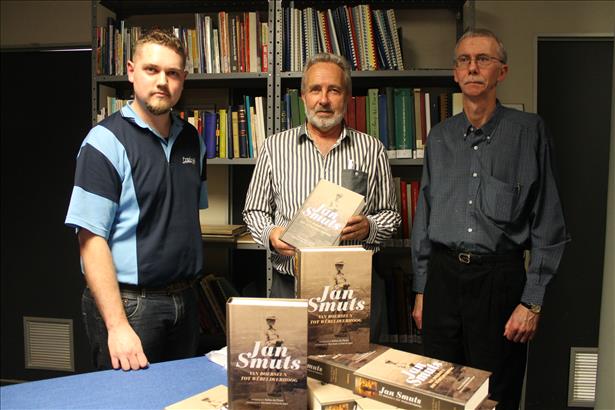Latest News Archive
Please select Category, Year, and then Month to display items
30 October 2018
|
Story Rulanzen Martin
|
Photo Peet van Aardt
 Some of the student writers who contributed to the anthology that tells their stories in Sesotho, isiXhosa, isiZulu, English and Afrikaans.
Some of the student writers who contributed to the anthology that tells their stories in Sesotho, isiXhosa, isiZulu, English and Afrikaans.
How do you transform the higher education curriculum? You involve the exact people the curriculum is intended for. The book, Initiative for Creative African Narratives (iCAN,) illustrates how decolonisation can be achieved through literature for students by students.
iCAN is an initiative by the Centre for Teaching and Learning (CTL) at the University of the Free State (UFS) to mentor students in creative and narrative writing. Under the mentorship of Dr Peet van Aardt, project coordinator, and Ace Moloi, author and UFS alumnus, iCAN Volume 1 was recently launched with 47 short stories written by UFS students.
“The project is a response from the centre for the ever-increasing need for decolonised curricula, steeped in the local cultural perspective of ubuntu,” said Dr Van Aardt.
“This book is an example for how decolonisation can be implemented,” said Prof Francois Stydrom, Senior Director of CTL. The overall aim of the iCAN project is to have the content that materialised from it to be included in the curriculum of first-year students at UFS in the near future.
Book provides multiple voices
Starting in May 2018, CTL presented a series of creative writing workshops on all three of the UFS campuses. “It’s a medium that allows a diverse range of students to express their views and develop their voices as writers,” said Prof Strydom.
It is a form of empowerment, to pass the baton to students to improve the UFS curriculum by writing and publishing their own stories, thereby contributing to larger bodies of knowledge through their lived experiences.
“I believe we as a university need to enable students so that they move away from just being users to becoming contributors to the curriculum,” Dr van Aardt concluded.
Jan Smuts: from country boy to world stage; a reassessment
2017-11-10

At the book discussion of Jan Smuts: van boerseun tot wêreldverhoog;
'n herwaardering, were from the left: Con Robinson, Protea Bookshop;
Prof Kobus du Pisani; and Prof André Wessels from the Department
of History at the UFS.
Photo: Leonie Bolleurs
Prof André Wessels from the Department of History at the University of the Free State (UFS) was one of 20 co-authors of Jan Smuts: van boerseun tot wêreldverhoog; 'n herwaardering – a book compiled under the leadership of the general editor, Prof Kobus du Pisani, from North-West University. This unique history book deals with the different themes in the life of Smuts, rather than describing the events chronologically.
South Africans are almost afraid of their own history nowadays ... and yet another history book is being launched. Does it make sense? Yes, for two reasons.
The monster in the dark
One of the ways to overcome fear is through knowledge. The monster in the dark disappears when one understands that the street lights and tree branches are creating interesting shadows. The more one knows about something, the less scary it becomes.
The Greek Bible
This was possibly also Smuts’s approach. Knowledge was his passion, and even today he is considered as one of the best students of the University of Cambridge. Although very few people really understand his holism theory, Smuts experienced the complex world in a very simple way – as one – not as lots of different pieces functioning independently of each other.
Smuts could have made a success of any of his interest fields – law, botany, literature, and philosophy. However, politics laid three wars on his doorstep. While he is regarded as a militarist by some, he was actually a peacemaker. He played a role in the establishment of the League of Nations, and later the United Nations. Incidentally, he continued to read the Greek Bible while on commando during the Anglo-Boer War.
A colourful character
The second reason for yet another Jan Smuts history book is his fascinating humanness. Time should be spent on colourful characters such as this. It is worthwhile hearing the story of someone who had such a great impact locally and internationally – good or bad.